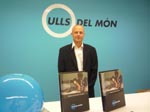Santiago Ruiz is an example of a professional involved with Eyes of the world in a non-health related project. Even though he has a degree in medicine and surgery, his subsequent specialty in management has led him to spend practically all of his working life in companies supplying hospital equipment. Santiago has collaborated with Eyes of the world for years, providing his experience in the private sector in order to improve workflow and achieve goals. In short, he plays his part by improving the efficiency of the actions carried out within the different cooperation projects for the benefit of the people living in the most impoverished countries.
How did you start collaborating with Eyes of the world?
In 2008 I joined the Alumni Giving Back programme, an Esade cooperation project with NGOs that provides a consultancy service led by alumni of the school. As a group of six people, we tried to understand what the world of management was like for a third-sector organization; in the end I think we took more than we gave. When I finished that year, Eyes of the world had already pinned me down and Núria Ramon offered that I continue what I do now.
What is currently your contribution?
Núria summarized it perfectly in the explanation she gave in the closing event of the programme: to create a space for reflection. I do not know if there are any magic formulas in management, let alone if they can be translated from a private enterprise to a non-profit organization. Where we are going and how do we get there, and if we do go, where was it decided that we should go. Those are the questions that I help ask the Eyes of the world leadership team.
Is there a big difference between the work that is done in an organization and the work that is done in a private enterprise?
The schedule, values and priorities, the process of defining what needs to be done and how to do it do not function as we are used to in a private enterprise. In an NGO the things that are decided to be done are done because they need to be. In a private enterprise, economic and political conditions no longer determine whether you can do it, as with NGOs; but if you should do it. In a private enterprise the activity itself generates a profit, with some atypicals as the exception. In theory, the more I work and the harder I work, the greater the benefit. In an NGO, the more and harder I work creates a bigger hole in the current account. It’s better to stand still! No, this is living!
Does the current economic crisis influence this?
Today money is less distributed. The economic operators who accumulate it are affected by a framework whose tensions are less conducive to social reinvestment. This undoubtedly makes it more difficult to secure funding.
How do you think Eyes of the world should advance in the future?
The foundation is clear about the focus of its projects, its reason of being, and how to carry them out. To dedicate itself to this, it is essential to develop an excellent line of work in its sustainability as an organization, from a political and economic point of view. Progress must be made in the professionalization of fundraising, so that commitment, not to existing programmes but to the mission itself, is not contingent on changes of external interests. The organization’s policies in this area must ensure budgetary stability.
What does collaborating with the Foundation bring to you personally?
Searching for that moral and economic equilibrium that is difficult to find when you work in organizations focused on economic benefit. And delving into generosity, giving for nothing. It is one of the things that brings the most happiness.
